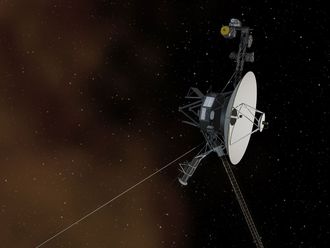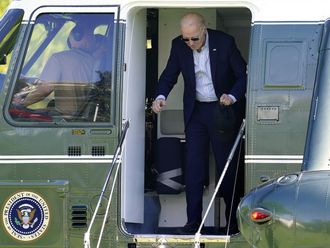Chichiriviche De La Costa , Venezuela: The outboard motor splutters to a stop and the boat drifts on the Caribbean swell. Nancy Rodriguez reaches down into a blue cooler and pulls out an electronic terminal and a handful of credit cards.
A mile (1.6 kilometres) out to sea, it's an unusual place to make a transaction. But this is crisis-worn Venezuela. In a country whose people can no longer rely on cash because of hyperinflation, the credit card - not cash - is king.
But cards require terminals, terminals need the internet, and in Chichiriviche de la Costa - a snug, hill-surrounded diving resort northwest of Caracas - the only internet signal can be found out at sea.
So four times a day, Rodriguez' crew fires up the outboard and takes her out to sea, where she can get an uninterrupted fix on a signal from Catia La Mar, down the coast.
Only then can the stocky 43-year-old restaurant owner charge up her customers for their fried fish.
On this trip, each of 13 cards is wrapped in a piece of paper on which Nancy's customers waiting on the beach have marked their ID number, the amount owed, and the card's pin code.
"Some are distrustful, others no. Those who are hungry have to trust someone," she said, smiling, as she keyed in the numbers and the amounts, fighting the rocking motion of the boat.
The oil rich country's economic crisis means serious shortages of food, medicines, supplies and spare parts. And cash. Venezuelans have to join long lines at ATMs. The withdrawal limit is 10,000 bolivars (Dh3598) a day, which these days will buy you a cookie.
President Nicolas Maduro attributes the cash crisis to mafias accumulating cash in order to speculate. But economist Tamara Herrera said hyperinflation and money being printed without supporting measures in the economy is the cause.
Waiting out the storm
The internet signal disappeared from Chichiriviche de la Costa last August. Locals say the cables and transmitters were stolen from one of the nearby mountaintops, a worrying sign of the times.
"We hope that the situation will change, because it is unsustainable. We are trying to do our best, waiting out the storm," Maria Victoria Garcia, owner of the Scubatec Diving Center, said.
Her diving school had about 100 customers at the weekend.
Like other businesses in the town, they work based on trust. Many clients pay for dives by bank transfers when they return to their homes, which can be up to three days later.
Most of Chichiriviche's residents have no bank account.
To pay her four employees, Garcia said she has to pay a 15 per cent commission just to be able to buy a carrier bag full of cash to pay them with. Failing that, she leaves them vouchers in the local shop, which they can exchange for groceries.
Like Nancy, Pedro Vielma, owner of the La Quilla Inn, uses what little cash he can get to buy fish for his guests' dinner.
"This is like a blocked cog in the wheel," he said, frustrated.
"This is crazy"
Hojilla is a popular street figure who guards people's cars. For cash. "Today nearly everyone told me 'we don't have any cash'."
"Sometimes they give me a beer, a cigarette or a sandwich. So that at least I'm not left without anything."
Frangeli Mayora, 25, regrets that almost no one brings cash to rent beach loungers and umbrellas. "It's hard. Since [former president Hugo] Chavez died, this is crazy."
Customers are also suffering. Isaac Reyes, a 36-year-old shop owner from Caracas, is annoyed at having to wait more than an hour to pay for a couple of drinks. Nancy invites him on the boat trip. "Come with me and you'll understand why," she said.
"[Expletive] This thing is a pain," said Reyes. "I came from Caracas to enjoy the rest, a break from the phone and the internet, only with this you get stressed out all over again."












